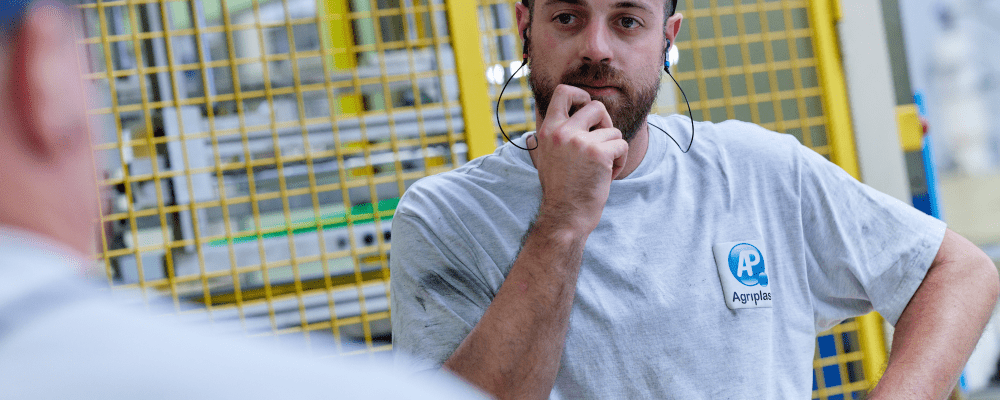Let’s face it: the reality is that if the boss doesn’t show up for work tomorrow, our plants won’t stop producing. But if, for one reason or another, our machine fitter/setters let us down, the whole thing could quickly come to a grinding halt. So what does that tell us?
This observation and its conclusion deserve our attention, especially as we – and we believe everyone else in our industry – are having major difficulties in recruiting skilled technical staff. Yet full employment is either a distant memory or a seductive mirage, and our industry has a future if it can be smart in successfully making the shift to the circular economy. So that’s something we are putting a lot of energy and determination into achieving.
In our business, as in many others, there are obvious areas where improvements need to be made to promote and build team loyalty, at the same time as facilitating recruitment of new talent. It is true that we have made progress, and it is equally true that industry in general has long since left assembly-line working behind in the dark ages, but let’s be brutally honest: our working environment is still very demanding, with 5×8, evening and weekend shifts. So it’s completely logical that improving wages and working conditions should be high on the list of priorities.
“I don’t plan to be doing this for the rest of my life”
It’s a phrase we hear all too often from the operators we hire. The technicality of the careers we offer means that they take time to learn, which runs rather contrary to societal trends and the attitudes and expectations of today’s rising generations, while we nevertheless seek to secure long-term engagement and commitment. The higher the level of employee turnover, the more negative impact that trend imposes on our business. So for some time now, our HR teams have been asked to take ownership of this issue so that they do not have to cope with this situation for all their working lives. The aim here is to put in place a genuinely effective training policy of in-house training programmes and pathways that give everyone the opportunity to progress within the company, and improve their working conditions and pay. These training programmes must be designed so that anyone who wants to, has the opportunity to become a machine operator, team leader, machine fitter/setter, maintenance technician, workshop manager, production manager or even plant manager, depending on their ambitions and abilities.
The obsession of manufacturing SMEs with keeping the machine running at all costs has often stifled strategic thinking around skills and training. The result looks more like firefighting: we’re one guy down, so we’ll quickly hire a replacement who can be trained up on the job by his colleagues who – by the way – probably won’t have been trained to be a trainer. Plus we’re now learning to live with the risk that a wave of retirements or departures to pastures new will (paradoxically) put us right back to square one.
So we believe that we must put skills back where they belong at the reactor core, because it’s vital for the appeal of our company and manufacturing industry in its entirety. As greater use is made of recycled plastics, the techniques and materials we use are changing in front of our eyes. At the same time, our machines are increasingly computer-driven and productive, which in turn means that special skills are needed to make the best-possible use of them. It’s clear then that taking action today to put in place the skills we will need tomorrow relies squarely on training.
The problem is that whether we look at France’s apprenticeship training centres (CFAs), consortia of local public educational institutions (GRETAs) or vocational technical colleges, there is a real disconnect between today’s range of training opportunities and the needs of manufacturing SMEs. If we look at our core business of plastics and extrusion blow moulding, only two training centres in France have an extruder demonstrator. That’s simply not enough to address the needs of our industry.
Plasti’Classes
That is the reason why we are launching Plasti’Classes. This training initiative will give trainees the opportunity to gain a formal qualification recognised by the French State and industrial companies: the Industry Manufacturing Equipment Operator Professional Qualification Certificate (CQP). This 6-month course will include 6 weeks of classroom training, and 18 weeks of in-company training. We believe it will help us recruit applicants who are looking for a new job or retraining opportunity so that we can train them to do the careers offered by our company and our industry.
But let’s be clear, these Plasti’Classes are far from being an end in themselves; they are simply a first step in the right direction. We want this training opportunity to open the new door that will help people to discover the careers we can offer, spark new vocations and offer realistic and attractive opportunities for career development. Naturally, this includes opportunities for permanent full-time employment, but also – and perhaps more importantly – a future of lifetime learning, upskilling and job progression.
Against a background of less than glorious globalisation and a succession of crises, we need to create non-offshorable jobs that generate real value for the company and its people. It is essential that our manufacturing SMEs succeed in recreating a working environment built on high value-added technical skills. What is at stake here is not simply our attractiveness as an industry, but also the industrial sovereignty of France itself.
